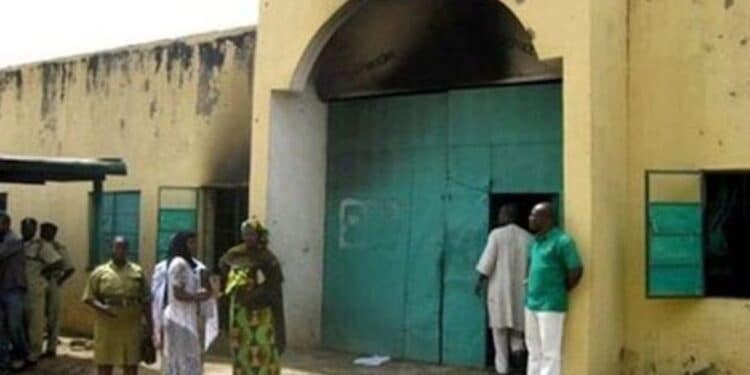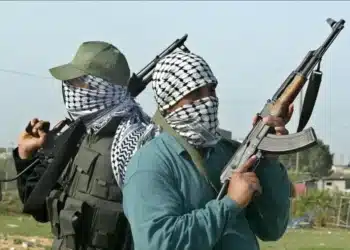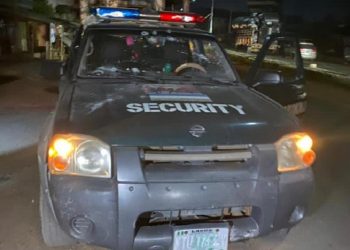Daredevil gunmen suspected to be members of the dreaded Boko Haram terrorist group last night, around 10pm, laid siege to the Medium Security Custodial Centre, Kuje, Abuja, attacking the facility with explosive devices and sophisticated assault weapons.
The gunmen, numbering about 300 according to eyewitnesses, rode motorcycles, invading multiple military and police checkpoints in the city to successfully overpower a garrison of Nigeria Army personnel and a contingent of police formation who were deployed to provide perimeter security for the facility, which holds high-level convicts and dangerous criminals awaiting trial.
Residents of the sleepy town raised the alarm around 10:20pm Tuesday night when they started hearing gunshots and explosions that shook windows and curtain blinds. They scampered for safety and fled for their lives in the attack that many initially thought was targeted at residents of Elrufai Estate, Kuje.
NSCDC officer killed in defence of the facility
The attackers invaded the facility with high-calibre weapons, maiming, burning, and bombing their way through obstacles and attempts by armed personnel on duty to repel the attack. At the end of the siege, a statement by the Correctional Service Public Relations Officer, Umar Abubakar, revealed that a total of 879 inmates escaped from the facility, though 443 have been recaptured. 551 inmates are currently in the facility, with four inmates dead and 16 inmates sustaining various degrees of injuries and being treated at the moment. An officer of the NSCDC also paid the ultimate price, while at least eight officers of the Nigeria Correctional Service sustained various degrees of injuries.
Kuje has experienced a high level of insecurity in recent months. Kidnapping for ransom, armed robbery and ritual killings are now commonplace. Just two weeks ago, the body of Hussani Aliyu Takuma was recovered by the police from his farm after he was brutally murdered.
The Nigerian Police and Military have since doubled their personnel stationed in and around Kuje and other adjoining satellite towns coming into Abuja. However, the attackers of the Kuje Correctional Facility, in their numbers, evaded the watchful eyes of the security apparatchik, operated for an hour, and escaped arrest by the state.
After the attack on the Nigerian Correctional Centre in Abolongo, Oyo State, the leadership of the Ministry of Interior, which supervises the agency, directed that the Nigeria Security and Civil Defence Corps, NSCDC, fortify all Custodial facilities in the country. It also wrote and sought the cooperation of the Nigeria Army and the Nigeria Police Force to provide additional security coverage of the facilities across the country.
Stationed permanently at the Kuje Correctional Centre are an armoured tank, platoons of soldiers, mobile police operatives with armed officers of NSCDC, men of the Department of State Security and NCoS providing support on perimeter security.
At the time of the attack, 38 military personnel were on the ground in addition to men of the Nigeria Police, Civil Defence, DSS and the armed squad of the Correctional Service.
Defence Minister, who supervises the military and other top government officials, paid an inspection visit to the centre on Wednesday, stating that the attackers came in with high explosives to attack a section of the perimeter wall.
“The incident took about 30 minutes, then reinforcements arrived. The inmates here are about 994. And when they broke out, because these people came specifically, we understand they are Boko Haram, they came specifically for their co-conspirators, to get them, they broke out other people in the general population so they can escape,” the Minister of Defence, Maj. Gen. Bashir Mgashi (rtd), was quoted.
A security expert and retired intelligence officer, Mr. Mohammed Bashir, noted that the attack on the Kuje Custodial facility goes beyond the ability of the Nigerian state to secure inmates properly, but calls into question the entire security architecture of the Nigerian state.
“I understand the Guards Brigade takes charge of the security of the seat of power. Even whilst driving into Kuje, Kubwa, Gwagwalada and its environs, you see them setting up checkpoints, so how are the attackers able to sneak in with their weapons undetected and leave unscratched? It calls into question the entire security architecture of the Nigerian State, as this is too close to the seat of power in Nigeria,” Mr. Bashor noted.










